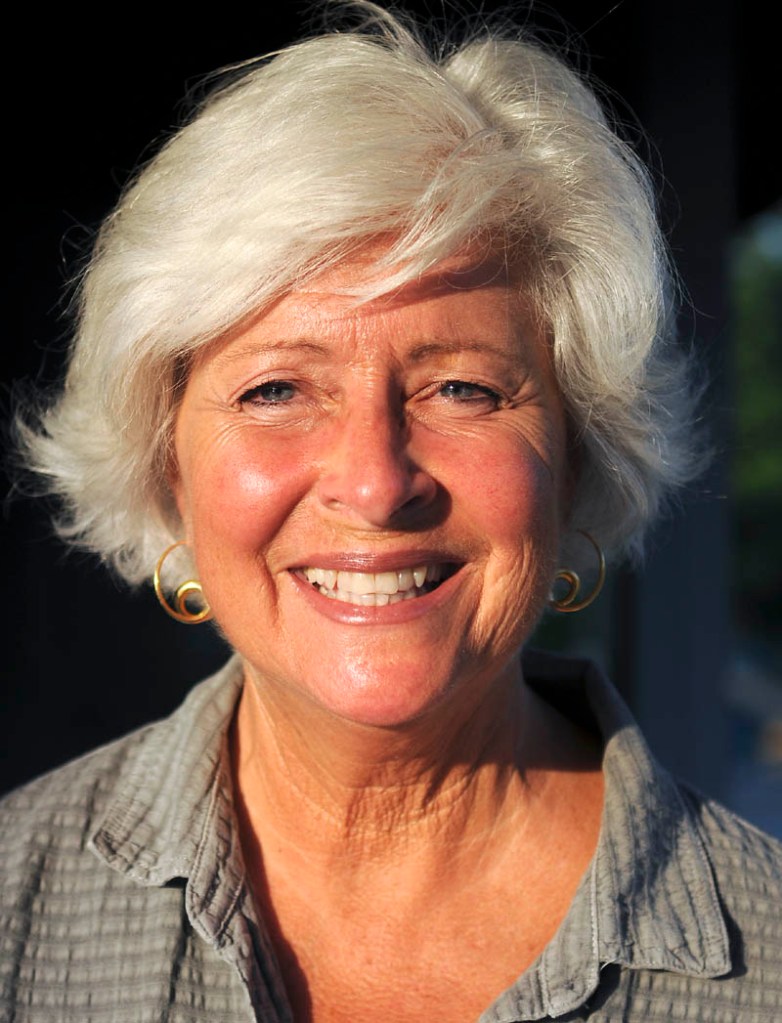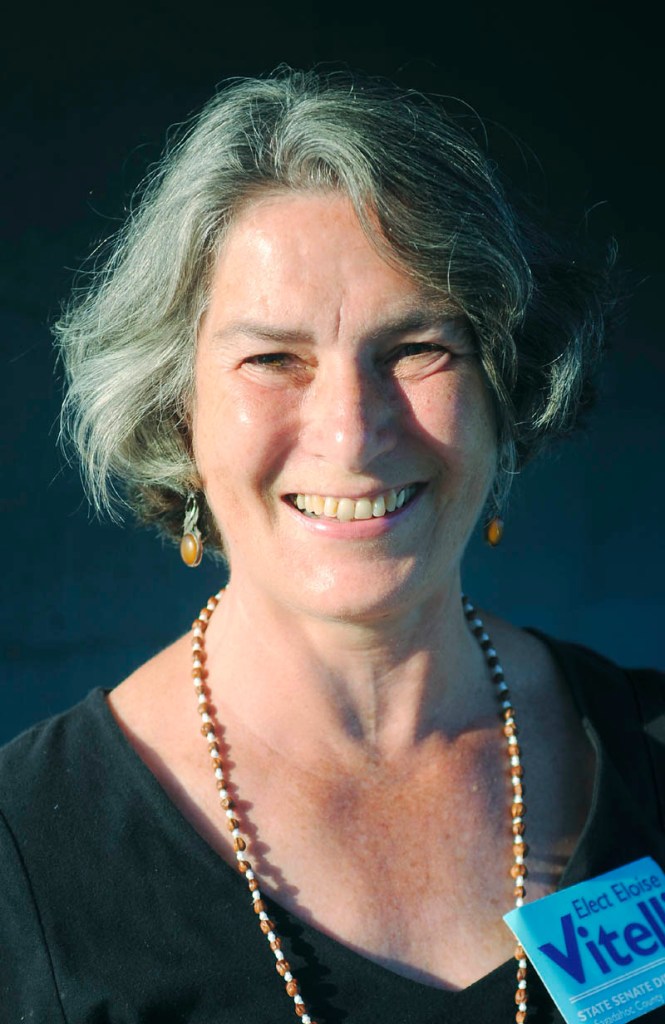Voters in Sagadahoc County and Dresden will choose between a former lawmaker, a women’s business advocate and a social worker in a Tuesday special election for an open state Senate seat.
The stakes are high for partisan interests. More than $146,000 of outside money — most of it benefiting the Democratic hopeful, Eloise Vitelli of Arrowsic — has flowed into the race for the Senate District 19 seat as of today.
The seat was last held by Richmond Democrat Seth Goodall, who resigned in June to head the New England offices of the federal Small Business Administration.
A win for the Republican hopeful, Paula Benoit of Phippsburg, who was elected to the seat in 2006 and beaten by Goodall in 2008 by 162 votes, would be a setback to Democrats as they gear up for a likely 2014 gubernatorial race between Gov. Paul LePage, 2nd District U.S. Rep. Mike Michaud, their presumptive candidate, and independent Eliot Cutler.
A third candidate, Green Independent Daniel Stromgren, is a social worker who describes himself as a moderate Green.
The election could greatly affect legislative work: If Benoit or Stromgren win, Democrats’ majority in the 35-member Maine Senate would be down to 18, the smallest number needed for a majority, making their proposals harder to pass.
To gird against that possibility, Democrats and their allies have spent more than $96,000 in independent expenditures to bolster Vitelli’s bid with campaign literature, ads and other campaign infrastructure, more than $78,000 from the state party committee itself as of today.
Republican interests have countered, but they haven’t kept pace, spending nearly $51,000 to help Benoit’s campaign. More than $46,000 of it has come from the state party.
Democrats, who had a 559-person edge over Republicans in the district in November, have taken out more absentee ballots than Republicans. Still, the race looks close.
Chief Deputy Secretary of State Barbara Redmond said 757 Democrats, 705 Republicans, 36 Greens and 318 unenrolled voters requested absentee ballots as of this afternoon.
Benoit and Vitelli mostly stick to party lines, highlighting their experience in business.
Benoit says the state’s welfare system is too large and crowding out funding for other priorities of government, echoing many legislative Republicans and LePage.
Vitelli says workforce development, expanding health care access and supporting public education — not the education-reform platform LePage is known for — are her main priorities.
Stromgren, the self-described moderate Green, says he’s focused on solving Maine’s problems, not simply on saying what’s wrong.
Republican Paula Benoit
Benoit, a former senator who has owned a Bath gift shop and co-owned a hair salon, said her experience tells her Maine has a shortage of qualified workers, largely because of a bloated welfare system.
The federal Census Bureau said Maine in 2011 had the highest percentage of state and local government spending — more than 23 percent. Benoit said that’s created a generation of young people who don’t know how to work.
“I’ve had people apply for jobs in my business where I knew I couldn’t hire them,” she said. “They had never worked, and that’s a burden on the business owner to have to pay them to train them how to even have decent manners with the clientele.”
In Augusta, she said her priorities will be on veteran issues and enhancing property-tax relief programs.
Earlier this year, the Legislature repealed the Maine Residents Property Tax and Rent Refund Program, known as the circuit breaker, replacing it with a smaller credit. Since then, Mainers have complained to lawmakers that refunds have diminished dramatically.
Benoit said she’s seen that impact on the campaign trail.
“Those are real people,” she said. “It’s hard to see that when you go door to door.”
In an interview, Benoit said because she wasn’t in Augusta to listen to House and Senate debates, she wouldn’t say what her stances were on support of the compromise state budget and expansion of MaineCare, the state-federal health care system for the poor under the federal Affordable Care Act.
The budget passed despite a LePage veto and MaineCare expansion, to be fully funded by the federal government for three years, failed after a veto.
But at a Thursday forum in Richmond, Benoit mostly echoed LePage’s argument, saying she was suspicious that the federal government would fund it for more than three years, calling it “a very slippery slope” that could make the state responsible for future costs.
Benoit said she’s in line with LePage’s fiscal conservatism and his ideas for educational reform. On his provocative speaking style, she is less enthusiastic. She said he and the media are at fault for the focus on his off-color comments, but his style wouldn’t match hers.
“I don’t get ruffled. I’m just not a fighter,” she said. “That’s been very helpful to me over the years because I can bring people together.”
Green Independent Daniel Stromgren
Stromgren, a social worker, is running an unusual campaign for a Green, saying he’s somewhat conservative for those in his party, which typically runs to the left of Democrats.
“It seems like, frankly, Republicans want to run against President Obama and Democrats want to run against Governor LePage,” he said. “What I saw was an opportunity to really not run against anybody, but run for District 19’s citizenry.”
He’s running on a number of policy-oriented platforms. For example, he would like to re-design Maine’s energy grid using incentives to convert to renewable sources of energy, like solar, wind and tidal power, selling unused power to a new state energy bank that could compete with bigger utilities on cost.
“It’s a daunting task. It’s not going to happen overnight,” Stromgren said. “It’s a starting point.”
Stromgren said as a Green, it’s redundant to identify himself as an environmentalist. He said he opposes the potential shipping of tar sands oil because Maine would mostly be a pass-through state, not gaining the reward of cheaper fossil fuel.
He also shares many priorities of Democrats, saying Medicaid expansion could help to control health care costs instead of having the state or hospitals provide care when people without health insurance go to the hospital.
Also, Stromgren said he supports public education more so than charter schools, a priority of LePage’s reform agenda. He said teachers make too little money, and Maine school administration is top-heavy.
“I actually believe in a small, streamlined government that can provide entitlements,” he said. “We don’t need to cut the fat out of the government to get rid of bureaucracy, we have to cut the bureaucracy out of the government to get rid of the bureaucracy.”
A July editorial in the Times Record, a Brunswick daily newspaper, said a Green candidate could be a spoiler in the race. Green voters are typically liberal, and he could split votes with Vitelli.
But Stromgren rejected that notion, saying he’s entirely different from the other candidates.
“I’m not out to take votes away from anybody, I’m out to create my own votes,” he said. “If we can overcome, basically, that ballot-box psychology, we have a very good chance because I really think people are looking for something fresh and something new.”
Democrat Eloise Vitelli
Vitelli, who has worked for more than 30 years as director of program and policy development for Women, Work and Community, a statewide group largely focused on improving the standing of women in business, said her profession prepares her for service.
At the State House, she said her main goals will be to tackle workforce development and education, issues she has already been working on.
For example, she worked with the Legislature’s Joint Select Committee on Maine’s Workforce and Economic Future, which was assembled in December 2012 and charged with reporting out a bill addressing Maine’s skills gap, the idea that workers’ skills don’t match up with jobs available.
The bill the committee crafted passed, and it is set to improve the transfer of credits between the University of Maine System and the Maine Community College System, also aiming to reduce waiting lists for popular community-college programs while providing financial assistance to adults who went to college but didn’t earn a degree, among other provisions.
Vitelli said Maine’s largest workforce challenge is “finding the right people for the right job and supporting both the workers to make sure they can further hone their skills, and employers so they understand how they can bring people along once they’re in the job and pay them a fair wage.”
On health care and education, Vitelli follows the party line.
She believes the LePage administration should have agreed to expand Medicaid and tried harder to implement the Affordable Care Act through insurance exchanges, saying Maine should “start from the premise that we have to expand health care access, not limit it.”
Vitelli said if the state’s public charter schools are draining resources from traditional public school districts, they’re a problem.
Under current law, K-12 schools that are close to public charter schools bear a large part of the funding burden because per-pupil state funding follows each charter-school student who leaves a traditional public school, diverting money from the public school system.
“I think the first order of business has to be to support our public, community schools,” Vitelli said. “Our community-based schools are such a key factor to our community development.”
Michael Shepherd — 621-5632
mshepherd@mainetoday.com
Send questions/comments to the editors.





Success. Please wait for the page to reload. If the page does not reload within 5 seconds, please refresh the page.
Enter your email and password to access comments.
Hi, to comment on stories you must . This profile is in addition to your subscription and website login.
Already have a commenting profile? .
Invalid username/password.
Please check your email to confirm and complete your registration.
Only subscribers are eligible to post comments. Please subscribe or login first for digital access. Here’s why.
Use the form below to reset your password. When you've submitted your account email, we will send an email with a reset code.